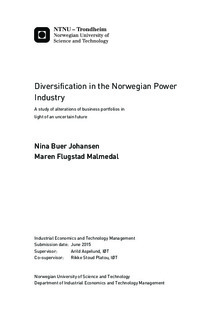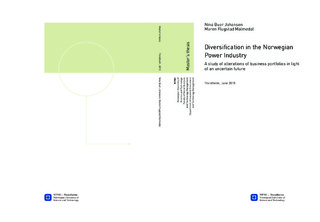| dc.description.abstract | In this thesis the diversification among the companies in the Norwegian power industry is studied. The industry has historically been a traditional and regulated industry with only small changes the last decades. However, the industry is now facing a highly uncertain future with many possible large changes. The literature on how companies strategically approach the future by changing their composition of business areas is characterized by large disagreements and no conclusive findings. This has led to this thesis research questions, which aims to uncover how and why the companies in the industry change their diversification when faced with a high environmental uncertainty.
To answer the research questions a multiple case study approach was utilized and a theoretical foundation was built based on the theoretical fields of environmental uncertainty and diversification. Interviews with 15 CEOs in the Norwegian power industry were conducted and together with data collection through written sources, this formed the empirical evidence for this thesis. The analysis of the 15 cases were done using cross-case analysis, as we wanted to reveal themes and conditions that involved all the cases and detect similarities and differences across the case companies.
The study has several contributions to theory. First of all, the diversification has increased among the actors in the Norwegian power industry, when exposed to high environmental uncertainty. This implies that broadening the business portfolio would be a good choice when the future is uncertain, supporting the view that promotes diversification. However, the findings contradict the theory claiming that unrelated diversification is most advantageous when the environment is uncertain, as related diversification is preferred over unrelated diversification by the companies in the industry. Further, the study reveals that the companies reasons for changing their diversification is mostly influenced by internal factors. This supports the theory, which emphasize that utilizing a company s resources are more important than adapting to the external market. | |

